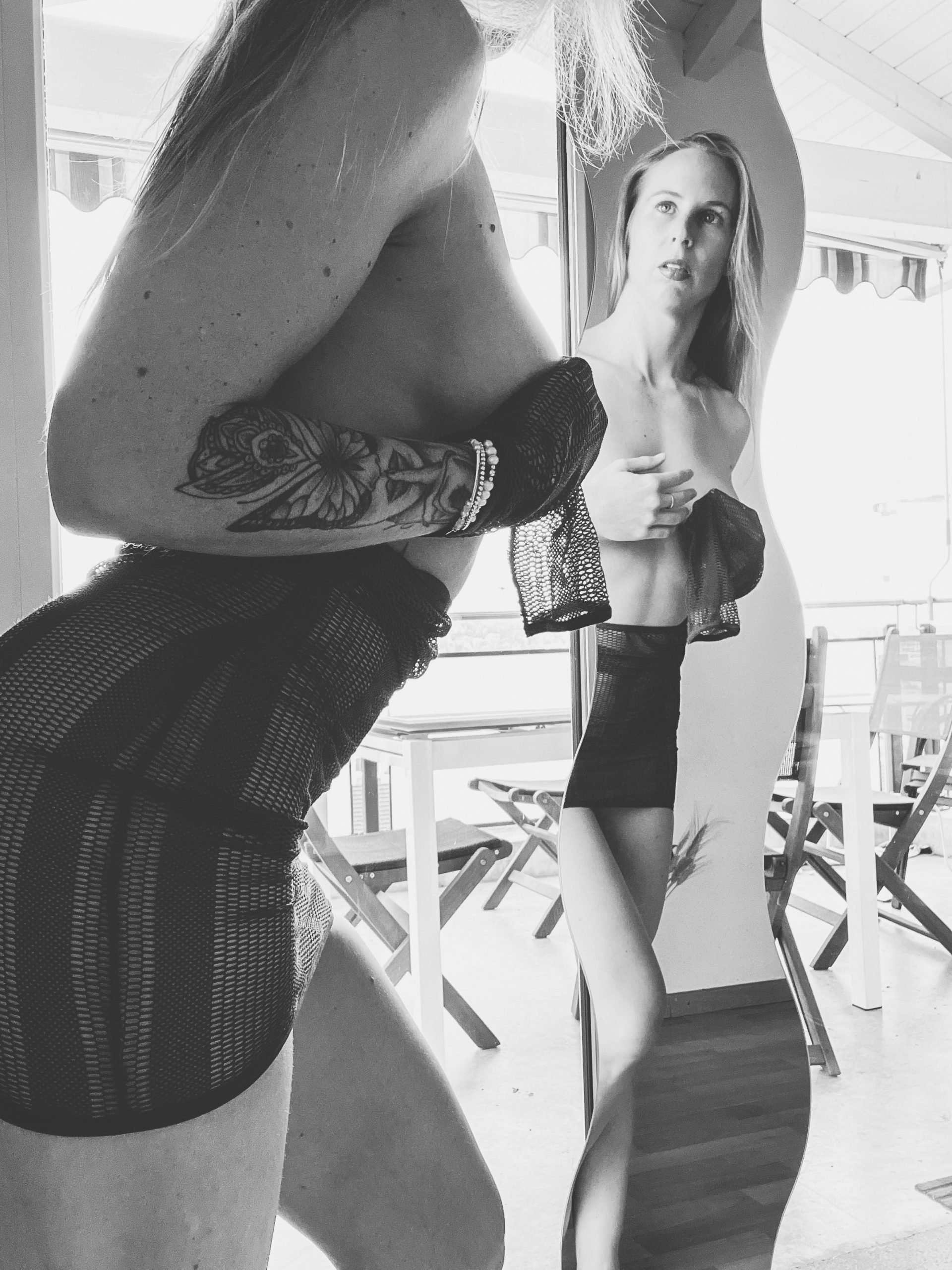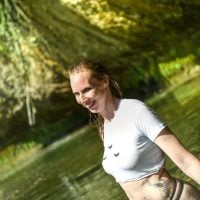
I have not shared self photography in this manner on Instagram for a long time.
I am caught between sharing myself and the algorithms that misunderstand and misappropriate us. I am caught between those who do not know me and place me in a box of one perspective, “I thought you were a yogi,” and the desire to let the world see all aspects of me so I can further lean into healing and wholeness.
Today, as I was listening to a podcast with @peterattiamd and @estherperelofficial, it sparked the desire to share some self photography. Esther Perel said eroticism challenges us to seek a different kind of resolution, to surrender to the unknown and ungraspable, and to breach the confines of the rational world.
We call on the erotic in challenging times in order to revive ourselves, our relationships, and entire communities, restoring the life force of vibrancy, curiosity, and spontaneity that make us feel alive. Sexuality is a lens—it tells the value, the behaviours, and the attitudes toward the body and pleasure, toward power and connection, toward division of spirit and flesh, or mind and body, or all of those things.
Today I was inspired by some photographers, @renaudlucas_, @michelle_yogogirls, and @sachaleyendecker, to call on the experience of life through photography, and to share myself and art unapologetically. Because sometimes I just need to surrender to being me—no question, no thought, no wondering what others think—and lean into the unknown.
I am reminded that in oneself lies the whole world, and if you know how to look and learn, the door is there and the key is in your hand. Nobody on earth can give you either the key or the door to open, except yourself.
One of the things that people do not realise is that behind my art and photography there is a healing process. Behind these pictures I am a girl who has experienced rape, lost a child, and been physically and mentally abused.
After the rape, I was numb for two years. I could not feel the temperature of the days. In the middle of the Austrian winter I would wear a short jean skirt and a small jacket, and in the heat of summer I would not sweat. I have moments of my life and letters I wrote during those two years that people tell me about, which I cannot remember.
I remember feeling deeply impacted by words of love and songs of love, and asking people not to say them or to turn the song off.
I remember when the numbness went and I felt the eroticism of the senses and pleasure for the first time again—I was standing in a field in Austria in October, the sun beating down. It was an unusually warm autumn and I wondered what the warmth was on my skin—I looked up at the sky and saw the sun. I realised that I had not noticed it for years—the light of the sun, the heat of the sun, and how beautiful it feels. I started to cry, the emotions flooding back, and sensations overwhelming me. I could not process them as I had not felt them for so long.
It was after this moment I started creating art and sharing myself through self photography. It became a part of my self-care—boudoir photography. It was a way of leaning into the unknowing, feeling pleasure, rewriting old stories, and relearning myself. It was a way of seeing myself through beauty, and feeling pleasure rather than shame, pain, or my trauma of rape, and belief that I was not worthy. It was a way of leaning into the unknowing and surrendering to the possibilities of better tomorrows.
Over the years I have experienced physical abuse that left me lost, thinking I deserved the pain, and confused, because in those moments, I thought it was my fault—if only I did not raise my voice, if only I had agreed and listened, if only I wasn’t emotional, then I wouldn’t have their hands around my throat, I wouldn’t be flying across the room and hitting the floor, or sitting there hoping the pain would numb my confusion, wondering how to regain my sense of self.
The emotional abuse made me lose me. It took so much of me that I began to feel that I was those words and that I deserved the pain because I caused it. I no longer felt alive or worthy to be here. I thought everything was my fault and that it was better for all to just go. I made an attempt on my life.
This abuse was like a cycle of “Pleasantville.” I would see the world in full color and experience all its beauty, then the abuse would come and the world would slowly turn grey, black and white, and sometimes completely black. It would take me days to find some light again, smile, and find a sense of myself to operate as a mother or human with some sense of lightness. It wasn’t until I started to dance and learn pole dance that I started to realise I was not those words that they had said, which had lead me to the darknesses ledge.
It wasn’t until I started creating my art and then sharing it, that I started to find myself again, from under the rubble of abuse and pain. I was able to see my body, heart, and soul again, through the screens of distorted thoughts, lenses, and lost self in pain. It was the art of learning to lean into the self and find what gave me pleasure that helped me to see the lies, untruths, and disempowering stories I had told myself of my experiences.
It was leaning into the eroticism of life that gave me my healing from these experiences and helped me to find myself again.
So many people think that eroticism is sex; however, it is actually sexuality transformed by the human imagination—it’s the thoughts, dreams, anticipation, unruly impulses, and even painful memories, which make up our vast erotic world.
What I realised as I moved and took photos was that it energised my entire experience and humanness of life and allowed me to play again, like my inner child yearned for. It was layered with early childhood touch, play, or trauma, and these parts were my and are our erotic life.
What I have learned through my trauma and healing is that the things that give me the most pleasure often come from the most painful sources—they are not comfortable, nor is eroticism. There is no neat and paved path to healing inner turmoil or emotional stressors, or to growth, nor is there to eroticism—it is a mix of excitement and anxiety.
We so often measure and judge ourselves, and our body becomes a prison rather than a beautiful garden to explore. When we struggle with our bodies, why would we explore them? How would we feel safe to experience life fully? So many of us due to trauma, words others have said, society, and life experiences are too self-critical; we forget the healing aspect of our bodies and we never experience the internal wonders and healing powers.
It is not about sexuality as society sees it. It is about our dreams, who we are, heart and soul.
Erotic self-care is a gift to self-love. It is a gift to healing and is about giving ourselves permission to feel beautiful, and to enjoy our own company and all the wonders in life. It is about being more compassionate, empathetic, and realistic about who we are without repression, shame, or judgement.
Eroticism is about understanding what turns us on and what turns us off in life—and knowing that we turn ourselves on and off. Eroticism is about understanding how to feel again when we are depressed, anxious, or have trauma. It is about finding our way back home to simple pleasure and light. It is an important part of self-care, overlooked by many because we do not see it through the full lens.
Ask yourself how you turn yourself on? Dancing, taking photographs, doing yoga, swimming, listening to music that makes me move, and drinking hot chocolate makes me turned on.
Ask yourself, how do you turn yourself off? For me, it’s about sitting in my thoughts too long, listening to others’ judgment of me, staying on my phone comparing myself to others on social media, not going outside, and not moving.
To feel deserving, purpose, and alive, desire and self-worth go hand in hand. I know for a long time after my rape and abuse I did not enjoy sensual touch. I did not feel attractive. I felt ashamed to be me, and I hid myself, from myself and others. It was only through changing this story through movement, photography, and art, that I realised I deserved to feel good, and that it is an integral part of self-care, being healthy, healing, and being a better person and mother. It was about making that decision to open up again and receive, and respond to me and to life, and pay attention.
I invite you to place eroticism into your life through a new lens—one of self-care.
>> Start simply, by using your senses to find what turns you on, brings you joy, and makes you feel purpose. Start doing more of that.
>> When you drink your tea, taste the beautiful defined flavours running over your taste buds, and feel the temperature that is just right.
>> When you go for a walk or run, listen to your feet on the ground, feel the wind in your hair, the warmth of the sun, and the blood pumping.
>> When you listen to music, create playlists for sleep, to lift you up, to make you think, and to give you energy.
>> When you wake up in the morning, instead of going on social media, make your first view one of nature, the sunrise, or a person’s face you love, and take it all in.
Self-care isn’t just about having a bath and practicing mindfulness; they are lovely, but there is so much more. It is about healing—about tuning into our bodies, minds, and souls. It is about letting them teach us what we need and who we are, what we like and do not like.
Getting to know ourselves and learning to connect better to ourselves helps us, in turn, to connect better to our families, friends, strangers, and lovers, with more empathy and compassion.


 Share on bsky
Share on bsky




Read 7 comments and reply